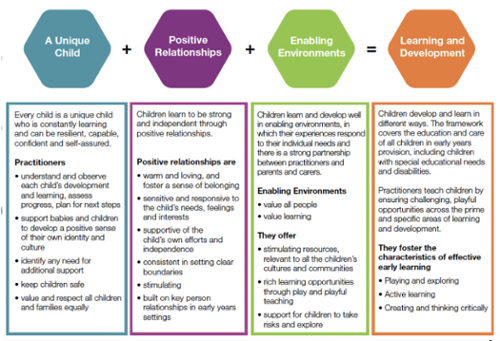Discover the meaning and importance of pedagogy in Early Years Education, focusing on the UK context and the reasons why we've adopted the Birth to Five Matters Framework as our primary means to observe, assess and plan activities in and around the development of your child up to and including the point of school readiness at five years old
The Concept of Pedagogy in Early Childhood Education
In the field of early childhood education, pedagogy refers to the strategies, methods, and approaches used to support children's learning and development. It encompasses the ways in which educators interact with children, create learning environments, and facilitate meaningful experiences. Pedagogy in early childhood education is based on the understanding that children learn best through active exploration, play, and social interactions.
Effective pedagogy in early childhood education considers the individual needs and interests of each child, as well as the cultural and social context in which they are learning. It recognizes the importance of building positive relationships with children and creating a supportive and inclusive learning environment. Pedagogy in early childhood education also emphasizes the role of educators as facilitators and co-learners, rather than simply instructors.
The Key Principles of Pedagogy in Early Childhood Education
There are several key principles that underpin pedagogy in early childhood education. First and foremost, it recognizes the importance of child-centered learning. This means that the learning experiences and activities are designed to meet the needs and interests of each individual child, allowing them to actively engage and take ownership of their learning.
Another key principle is the focus on holistic development. Pedagogy in early childhood education takes into account all aspects of a child's development, including their physical, cognitive, social, emotional, and creative development. It seeks to provide a balanced and comprehensive learning experience that supports the growth of the whole child.
Pedagogy in early childhood education also values play as a central component of learning. Play is seen as a natural and meaningful way for children to explore, make sense of the world, and develop essential skills and knowledge. Educators create play-based environments that promote open-ended exploration, problem-solving, imagination, and creativity.
Furthermore, pedagogy in early childhood education promotes collaborative learning and social interaction. It recognizes the importance of peer interactions and cooperative learning in fostering children's social skills, communication abilities, and empathy. Educators facilitate opportunities for children to work together, engage in group activities, and learn from each other.
Lastly, pedagogy in early childhood education emphasizes the role of assessment in informing and guiding teaching practices. Educators use various assessment methods to observe and document children's progress, understanding, and strengths. This information is then used to tailor the learning experiences, provide targeted support, and ensure continuous improvement.
The Role of Pedagogy in Supporting Children's Development
Pedagogy plays a crucial role in supporting children's development in early childhood education. By employing effective pedagogical strategies, educators can create a nurturing and stimulating environment that promotes optimal learning and growth.
Firstly, pedagogy ensures that children have access to a wide range of learning opportunities that cater to their unique needs and interests. It enables educators to plan and deliver experiences that are developmentally appropriate, engaging, and challenging. This helps children acquire new knowledge and skills, develop their abilities, and reach their full potential.
Pedagogy also fosters the development of essential skills and competencies in children. It provides opportunities for children to practice and refine their language and communication skills, problem-solving abilities, critical thinking, creativity, and social skills. By engaging in purposeful and meaningful activities, children can develop a strong foundation for future learning and success.
Furthermore, pedagogy in early childhood education supports children's emotional well-being and social development. Educators create a safe and inclusive learning environment where children feel valued, respected, and supported. They promote positive relationships and interactions, teach conflict resolution skills, and encourage empathy and understanding. This helps children develop a strong sense of self, build positive relationships with others, and navigate social situations effectively.
Lastly, pedagogy promotes lifelong learning and a love for learning in children. Through engaging and meaningful experiences, children develop a curiosity, enthusiasm, and motivation for learning. They become active participants in their own learning journey, developing a growth mindset and a love for exploration, discovery, and knowledge.
 Child Led-Learning
Child Led-Learning
Learning how children learn best....
The theory of child-led learning is well established and posits that children, particularly in the early years, learn best through play. This is fundamental to all children and some might argue, to all adults. In fact, there is a debate raging throughout educational policy as to whether the traditional adult-led / teacher instructive (or what we would call “didactic”) models of teaching are relevant for a future that requires children to think less mechanically (i.e. you tell me what to do, I’ll try and remember and then replicate) and more iteratively (i.e. creatively and exploratively).
The early years is the only segment of the educational life cycle of a child that fully employs the theories of learning through play. The topline principles are set out in the Birth to 5 Matters framework - t speaks to the need to understand that every child is unique and if presented with nurturing relationships from a skilled educator, in an environment that is replete with the exciting materials for him / her to acquire knowledge and skills through, then learning and development will occur. It is the very reason for continuous provision - the way you lay out your rooms with resources to challenge and excite the children to self-explore, learn and develop freely. See this blog for some useful guidance on continuous provision and some further thoughts here from Alistair Bryce-Cleggs. Another useful source is Evaluating Early Years Practice in your School, by Ann Langston.
Adult Led Sessions
Developing the role of the teacher....
But as the children get older and move into preschool, there is more of a requirement for the educators to become more “active”. There is a balance between what the child is capable of achieving and learning on their own and what needs to be introduced - as concepts / ideas or themes - by an experienced educator to expand the child’s horizons. The theory is based on something called the “zone of proximal development”, first posited by Lev Vygotsky, as that space between what is known and what is not known by the learner, the space in which an educator stands to guide, nurture, encourage, facilitate and steer the learner to acquire more knowledge.
The challenge of the educator is to find that balance: to know what the child knows and what he / she doesn’t, to present new information to him / her in a way that is appealing and exciting and then to act as a guide to steer the child to learn him or herself, grasping concepts and moving forward with them independently. As Julie Fisher writes in her book, ‘Starting from the Child’, the educator (adult or child peer) needs to be informative without being imposing: a balance needs to be struck. And that kind of makes sense. After all, letters and numbers are intrinsic to our adult life but are wholly alien concepts to a child - they would not arrive at understanding what constitutes a numeral and its relation to computation without an educator steering them towards that knowledge. And that is why we have talking time, letters and sounds, and Jolly Phonics as fun, play based but definitively adult-led activities. The theory was defined by Jerome Bruner as “scaffolding”, where we incrementally build knowledge, step by step
Pedagogical Approaches in UK Early Years Education
In the UK early years education, various pedagogical approaches are used to support children's learning and development. One commonly used approach is the Reggio Emilia approach, which emphasizes child-led learning, creativity, and collaboration. This approach views children as competent and capable learners, and values the role of the environment in facilitating learning.
Another widely recognized approach is the Montessori method, which focuses on fostering independence, self-directed learning, and the development of practical life skills. Montessori classrooms are carefully prepared to promote hands-on exploration, choice, and freedom within limits.
The High/Scope approach is also commonly used in UK early years education. This approach emphasizes active learning, where children engage in plan-do-review cycles and take ownership of their learning. It promotes the development of problem-solving skills, decision-making abilities, and social competence.
Furthermore, the Forest School approach, which originated in Scandinavia, has gained popularity in the UK. This approach takes learning outdoors and places a strong emphasis on nature and the environment. It provides children with opportunities for hands-on experiences, exploration, and connection with the natural world.
These are just a few examples of the pedagogical approaches used in UK early years education. Each approach has its own unique philosophy and principles, but all aim to support children's learning, development, and well-being in holistic and meaningful ways.
Implementing Effective Pedagogy in Early Childhood Settings
Implementing effective pedagogy in early childhood settings requires careful planning, ongoing reflection, and collaboration among educators, families, and the wider community.
Firstly, it is important for educators to have a deep understanding of child development and the principles of effective pedagogy. This knowledge enables them to create learning experiences that are responsive to children's needs and promote optimal learning and development.
Educators should also create a supportive and inclusive learning environment that reflects the diverse backgrounds, cultures, and abilities of the children in their care. This includes providing resources and materials that represent different cultures, promoting inclusive language and interactions, and celebrating diversity.
Furthermore, effective pedagogy in early childhood settings involves building strong partnerships with families. Educators should engage families as partners in their child's learning journey, involving them in decision-making, sharing information about their child's progress, and seeking their input and feedback. This collaboration helps create a seamless and cohesive learning experience for children, where the home and early childhood setting work together to support their development.
Lastly, ongoing reflection and professional development are essential for implementing effective pedagogy. Educators should regularly reflect on their practices, seek feedback from colleagues and families, and engage in professional learning opportunities to continuously improve their pedagogical skills and knowledge. This ensures that educators stay up-to-date with the latest research and best practices, and can provide high-quality learning experiences for children.
In conclusion, understanding the definition of pedagogy in early childhood education is essential for creating an enriching and effective learning environment for young children. By embracing child-centered approaches, holistic development, play, collaborative learning, and assessment, educators can support children's learning, development, and well-being. Implementing effective pedagogy requires ongoing reflection, collaboration, and a commitment to lifelong learning. Ultimately, effective pedagogy in early childhood education sets the foundation for a lifelong love for learning and prepares children for future success.

02-Feb-2024 12:27:11
Related Articles





Write a Comment